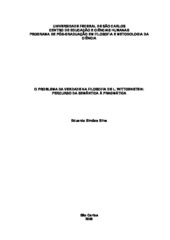| dc.contributor.author | Silva, Eduardo Simões | |
| dc.date.accessioned | 2016-06-02T20:13:06Z | |
| dc.date.available | 2008-03-25 | |
| dc.date.available | 2016-06-02T20:13:06Z | |
| dc.date.issued | 2008-03-10 | |
| dc.identifier.citation | SILVA, Eduardo Simões. O problema da verdade na filosofia de L. Wittgenstein:
percurso da semântica à pragmática. 2008. 144 f. Dissertação (Mestrado em Ciências Humanas) - Universidade Federal de São Carlos, São Carlos, 2008. | por |
| dc.identifier.uri | https://repositorio.ufscar.br/handle/ufscar/4829 | |
| dc.description.abstract | This study aims to examine the problem of truth as it presents itself in L.
Wittgenstein's philosophy. Problem this, which will be presented not isolated from
discussions on the truth raised in the history of philosophy, but within a broader
context of the theories of truth in their projects. Thus, the work will develop in the
following way: in the first chapter will be addressed various theories of truth, without
any judgment of value to be raised as their projects (it is a chapter whose function is
strictly descriptive). In the second chapter, will be presented the philosophy of the
Tractatus Logico-Philosophicus (1922) of Wittgenstein, specifically, with regard to the
interest of this study, namely, the conception of truth as correspondence (Truth and
Figuration) - with this chapter, claims to identify the discussion on the truth in
Wittgenstein with a broader project of truth. In the third chapter, will be addressed to
the philosophy of Philosophical Investigations (1945) as a radical contrast to the
tractatian vision of the problem of truth, where the author explains his criticism of
traditional concepts of the meaning in favor of a pragmatic use of the language. It is
expected with this chapter to establish a link between the Tractatus and
Philosophical Investigations, or rather indicates possible errors which Wittgenstein
himself would have found in Tractatus, mistakes that would justify the changes of
direction of the first to the second work. What Wittgenstein proposed from
Philosophical Investigations is a new method to avoid conceptual confusions, and the
emphasis will no longer be in the search for the essence of language or the logical
way of proposition, but in the use we make of language in our daily practices | eng |
| dc.format | application/pdf | por |
| dc.language | por | por |
| dc.publisher | Universidade Federal de São Carlos | por |
| dc.rights | Acesso Aberto | por |
| dc.subject | Verdade | por |
| dc.subject | Pragmatismo | por |
| dc.subject | Filosofia | por |
| dc.subject | Wittgenstein,
Ludwig Josef Johann, 1889-1951 | por |
| dc.title | O problema da verdade na filosofia de L. Wittgenstein:
percurso da semântica à pragmática | por |
| dc.type | Dissertação | por |
| dc.contributor.advisor1 | Cass, Mark Julian Richter | |
| dc.contributor.advisor1Lattes | http://lattes.cnpq.br/6549114665097353 | por |
| dc.description.resumo | Este trabalho tem por finalidade analisar o problema da verdade tal
como ele se apresenta na filosofia de L. Wittgenstein. Problema este, que será
apresentado não isolado das discussões sobre a verdade levantadas na história da
filosofia e sim inserido num contexto mais amplo das teorias da verdade e de seus
projetos. Dessa forma, o trabalho se desenvolverá da seguinte maneira: no primeiro
capítulo serão abordadas as diversas teorias da verdade, sem que quaisquer juízos
de valor sejam levantados quantos seus projetos (trata-se de um capítulo cuja
função é estritamente descritiva). No segundo capítulo, será apresentada a filosofia
do Tractatus Logico-Philosophicus (1922) de Wittgenstein, especificamente, no que
concerne ao interesse deste estudo, a saber, a concepção da verdade enquanto
correspondência (Verdade e Figuração) com esse capítulo, pretende-se identificar
a discussão sobre a verdade em Wittgenstein com algum projeto mais amplo da
verdade. No terceiro capítulo, será abordada a filosofia das Investigações Filosóficas
(1945) como uma contraposição radical à visão tractariana do problema da verdade,
onde o autor expõe sua crítica às concepções tradicionais do significado em favor de
uma concepção pragmática de uso da linguagem. Espera-se com esse capítulo
estabelecer um vínculo entre o Tractatus e as Investigações Filosóficas, ou melhor,
apontar possíveis erros que o próprio Wittgenstein teria encontrado no Tractatus,
erros que justificariam as mudanças de rumo da primeira para a segunda obra. O
que Wittgenstein propõe a partir das Investigações Filosóficas é um novo método
para evitar confusões conceituais, e a ênfase não será mais na busca pela essência
da linguagem ou pela forma lógica da proposição e sim no uso que fazemos da
linguagem em nossas práticas cotidianas | por |
| dc.publisher.country | BR | por |
| dc.publisher.initials | UFSCar | por |
| dc.publisher.program | Programa de Pós-Graduação em Filosofia - PPGFil | por |
| dc.subject.cnpq | CIENCIAS HUMANAS::FILOSOFIA | por |
| dc.contributor.authorlattes | http://lattes.cnpq.br/4739161935290553 | por |
